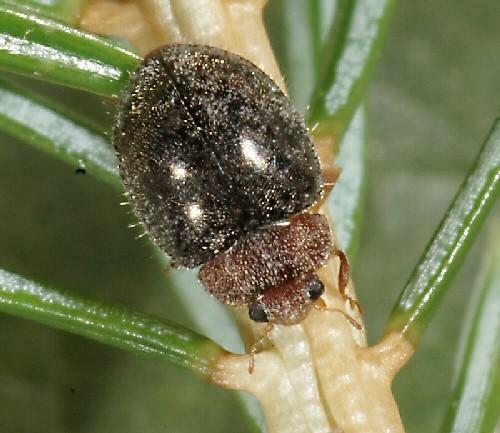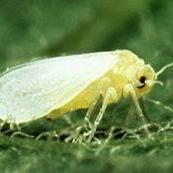Lindorus Lindorus lophanthae
Description
Lindorus lophanthae is a species of ladybird native to Queensland and Southern Australia. It is commonly known as the scale-eating ladybird and the purple scale predator. Synonyms for this species are Rhyzobius lophanthae, Scymnus lophanthae and Rhyzobius toowoombae.
Lindorus adults are around 2-2.5 mm long with a reddish-brown head and prothorax. The elytra (wing cases) are dark brown-black and the body is covered with short fuzzy hairs. The larvae have patterned light and dark grey markings with black heads. Their bodies are covered with short spines. The larvae go through four stages (instars) before pupating and later emerging as adult beetles. The pupae are orange-pink coloured and oval shaped.
Both adults and larvae feed on scale insects (especially armoured scales), at all stages of their development. Other prey includes mealybugs, soft scales and moth eggs. Eggs are generally laid under scale covers or into egg masses. The younger larvae feed under the scales protective covering. Larger larvae feed externally with the 4th instar larvae and adults being the stages that consume the majority of prey.
The optimum temperature range for Lindorus is around 18-30°C but it can tolerate a wide range of temperatures, as experienced in Queensland and Southern Australia where it occurs naturally. Adults live for approximately 100 days, depending on conditions. Unlike many other ladybird species, it appears that Lindorus does not go through diapause in winter – it persists throughout all seasons with several generations per year. Females can produce over 500 eggs during their lifetime, depending on nutrition.
Suitable hosts/crops
Lindorus can be used to control various types of sap sucking scale insects including many armoured scale species such as red scale, oleander scale, oriental scale and purple scale. They will also feed on several species of soft scale including soft brown scale and black scale, several species of wax scale, some mealy bugs and moth eggs. They do not tolerate heavy secretions of honey dew.
They can be used in a variety of situations but are mostly suited to conservatoriums, nurseries with mature plants such as palms and some orchard situations.
When to release
It is beneficial to have a resident population of Lindorus in the crop to keep scale pests in low numbers. When establishing a new crop, or when scale numbers are high, additional Lindorus will need to be released. Ladybird establishment is more effective when pest density is high as they have a plentiful food source, which can result in large numbers of beetles being produced.
For Red Scale in citrus it is advised to place more emphasis on Aphytis releases.
How to release
Lindorus are dispatched in punnets of 100 beetles with a small amount of honey or glucose to feed on during transit. Do not open the punnet until you are in the destination crop. Best results will be achieved if you carefully sprinkle Lindorus in proximity to scale infestation hot spots.
Release rates
Inoculate each infested plant with approximately 10 beetles. If large areas need releases 1000/ha is suggested. Several releases 1-2 weeks apart is advised for best establishment.
Storage
For best results release adult beetles into the crop as soon as possible after they are received, however, they can be stored for a few days at 8-12°C if necessary.
Chemical use
Adult ladybirds are quite tough, but at establishment Lindorus are sensitive to many pesticides – pyrethroids appear to be the most toxic, but they are also sensitive to organophosphate and carbamate insecticides. Ladybirds are also affected by growth regulator pesticides such as Admiral and Applaud. Residues on foliage and greenhouse structures may remain toxic for many weeks and negatively impact on their survival and ability to effect control. Check side-effects charts carefully and avoid using pesticides directly before and after release unless they are known to be safe. Contact Biological Services for specific information.
Ordering and accounts
Orders are sent via express courier services on Monday or Tuesday of each week, and usually arrive within a couple of days. Orders received after noon on Tuesday are sent the following Monday.
Accounts are sent at the end of each month, and can be paid by EFT, BPay, cheque or postal order.

Related pests
- Mealy bugs
- Red scale
- Scale insects
Related crops
- Citrus
- Flowers/ornamentals
- Nursery
- Tree crops






